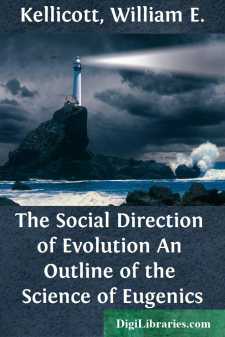Categories
- Antiques & Collectibles 13
- Architecture 36
- Art 48
- Bibles 22
- Biography & Autobiography 813
- Body, Mind & Spirit 142
- Business & Economics 28
- Children's Books 15
- Children's Fiction 12
- Computers 4
- Cooking 94
- Crafts & Hobbies 4
- Drama 346
- Education 46
- Family & Relationships 57
- Fiction 11828
- Games 19
- Gardening 17
- Health & Fitness 34
- History 1377
- House & Home 1
- Humor 147
- Juvenile Fiction 1873
- Juvenile Nonfiction 202
- Language Arts & Disciplines 88
- Law 16
- Literary Collections 686
- Literary Criticism 179
- Mathematics 13
- Medical 41
- Music 40
- Nature 179
- Non-Classifiable 1768
- Performing Arts 7
- Periodicals 1453
- Philosophy 64
- Photography 2
- Poetry 896
- Political Science 203
- Psychology 42
- Reference 154
- Religion 513
- Science 126
- Self-Help 84
- Social Science 81
- Sports & Recreation 34
- Study Aids 3
- Technology & Engineering 59
- Transportation 23
- Travel 463
- True Crime 29
The Social Direction of Evolution An Outline of the Science of Eugenics
Description:
Excerpt
THE SOURCES AND AIMS OF THE SCIENCE OF EUGENICS
"Bravas to all impulses sending sane children to the next age!"
Eugenics has been defined as "the science of being well born." In the words of Sir Francis Galton, who may fairly be claimed as the founder of this newest of sciences, "Eugenics is the study of the agencies under social control, that may improve or impair the racial qualities of future generations, either physically or mentally."
The idea of definitely undertaking to improve the innate characteristics of the human race has been expressed repeatedly through centuries—fancifully, seriously, hopefully, and now scientifically. Since the times of Theognis and of Plato the student of animate Nature has been aware of the possibility of the degradation or of the elevation of the human race-characters. The conditions under which life exists gradually change: the customs and ideals of societies change rapidly. Times inevitably come when, if we are to maintain or to advance our racial position, we find it necessary to change in an adaptive way our attitude toward these changing social relations and conditions of life. If we neglect to do this we go down in the racial struggle, as history so clearly and so repeatedly warns us.
In the opinion of many biologists and sociologists such a time has now arrived. The suspension of many forms of natural selection in human society, the currency of the "rabbit theory" of racial prosperity—based upon the idea of mere numerical increase of the population, the complacent disregard of the increase of the pauper, insane, and criminal elements of our population, the dearth of individuals of high ability—even of competent workmen, all are resulting in evil and will result disastrously unless deliberately controlled. It is hoped that this control, though at first conscious, "artificial," may later become fixed as an element of social custom and conscience and thus operate automatically and the more effectively. The result will be not only the restoration of our race to its original vigor, mental and physical, but further the carrying on of the race to a surpassing vigor and supremacy.
The aim of Eugenics is the production of a more healthy, more vigorous, more able humanity. Again in the words of Galton "The aim of Eugenics is to represent each class ... by its best specimens; that done to leave them to work out their common civilization in their own way.... To bring as many influences as can be reasonably employed to cause the useful classes in the community to contribute more than their present proportion to the next generation"; and further, we might add, to cause the useless, vicious classes to contribute to the next generation less than their present proportion.
With this definition of Eugenics and preliminary statement of its aims before us we may proceed to a somewhat fuller statement of the facts within this field. First let us consider the relation of the science of Eugenics to its parent sciences, biology and sociology, then after mentioning some of the steps in the development of the present eugenic movement, we may describe some of the conditions which give us human beings pause and lead us to appreciate the necessity for a reconsideration of much that enters into our present social organization and conduct....


